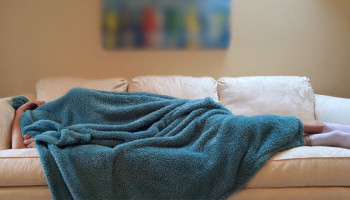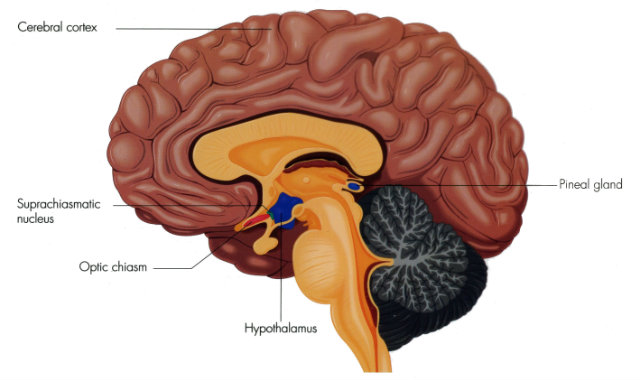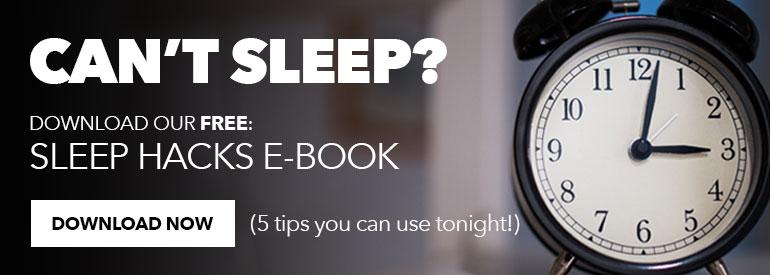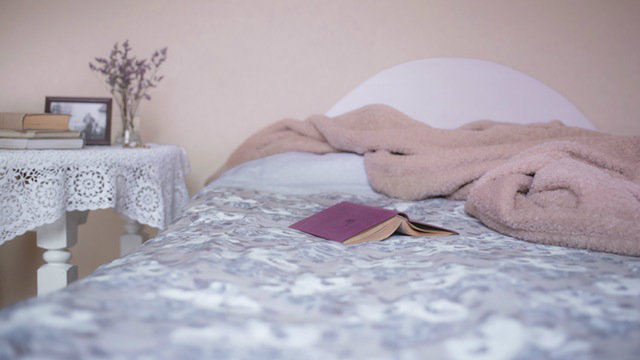 Reading Time: 7 minutes
Reading Time: 7 minutesIn today’s hectic society, sleep is a hot commodity. For most people, sleep doesn’t make it onto the list of important tasks. Many of us are so inundated by daily stress that it affects our sleep patterns in a major way. Let’s take a look at how this sleep deprivation affects our bodies — and I’ll warn you, it’s not for the best.
How Sleep Works on a Biological Level
In our brainstem, we have groups of nuclei called reticular formations. Reticular formations are important in regard to regulatory functions in our brain and are a major component of the reticular activating system, which along with many other functions, is responsible for our sleep-wake cycle.
An example of this system at work is when you set your alarm clock to wake you at a certain time. Your body sensing the noise of the alarm allows for you to arouse your consciousness. Similarly, when you turn off your lights and limit stimuli before bed, this can lead to drowsiness and eventually sleep.
The hypothalamus also has an impact on our sleep-wake cycle. A structure known as the suprachiasmatic nucleus acts as a master clock of our circadian rhythms.
The Adverse Effects of Lack of Sleep on Health
Now that you know a little bit about how sleep works biologically, what happens when we don’t get enough sleep? Sleep deprivation can cause a host of strange side effects. Some individuals may experience hallucinations, impaired brain function, loss of memory, and a slower metabolism. These are just a few of the adverse effects that we we’re about to go over in the next few studies.
According to Neuroscience and Biobehavioral Reviews, sleep deprivation can cause a wide variety of biological consequences. A few of these consequences include increased stress, altered inflammatory and blood clotting responses, and accelerated atherosclerosis (a hardening and narrowing of the arteries). All of these mechanisms link sleep deprivation with cardiovascular and metabolic disorders.
Epidemiological studies show that short sleep duration is associated with increased occurrences of coronary artery disease, hypertension, arrhythmias, diabetes, and obesity. Sleep deprivation by itself may not kill you, but it can lead to diseases that can cause health complications and even death in severe cases. The most problematic of the diseases mentioned above would be coronary artery disease and hypertension in that both of those conditions can cause heart failure.
Lack of Sleep, Memory, and Our Kids
According to the Journal of Sleep Research, a chronic lack of sleep is a common problem among adolescents. This doesn’t just present a health problem for kids, but also a learning problem. Before we go into this study, we first must understand how our brains work when it comes to forming memories. For the best results, a person should be completely done studying about an hour or two before bedtime. This is because humans consolidate and store their memories from the day during their sleep cycles.
This study aimed to see the effects of one-week of sleep restriction on the consolidation of long-term memory. The study used 56 healthy adolescents and they were instructed to remember a text passage in which half of the content was highlighted, or prioritized. They were told they would receive an additional bonus for remembering the prioritized content. They were allowed to view the prioritized content and study as necessary, so the participants could view the passage more than once, similar to how students study for exams. Once it came time to recall the information, though, participants were not allowed to view the passage at all.
Participants underwent a seven-night period where they were allowed to sleep for either five or nine hours. The free recall of the passage was tested at the end of the sleep manipulation period and again at six weeks.
The study results:
- The study determined that recall of the highlighted (prioritized) content was superior to that of the non-highlighted content at all three test points (initial, one week, and six weeks) in the control group, who slept for nine hours each night during the one-week study. This beneficial effect of highlighting passages was stronger for the control group than the sleep-restricted group, who only slept for five hours.
- Memory of the highlighted information was stronger after one week versus a few minutes after the initial presentation of the information. This was true only in the control group, not the sleep restricted group.
This gives us two important points to think on:
- Having a full night’s rest aids in memory consolidation.
- Our memory becomes stronger and more information moves into our long-term memory when we provide our brain with several nights of sleep to learn and consolidate the information.
This study shows that students need sleep in order to consolidate memories. This is especially true if a student needs to remember something of importance (prioritized content). Sleep deprivation can reduce the amount of information a student is able to effectively store and recall. Modern school systems tend to overload children with homework, but lack in physical activities. This can negatively affect a child’s overall sleep pattern, which can then negatively affect student performance.
Lack of Sleep and Your Daily Mood
The Journal of Sleep Research and Sleep Medicine conducted a meta-analysis by examining 143 studies on sleep deprivation. The results of the analysis suggest that sleep deprivation strongly impairs overall human functioning, which can manifest as memory loss, decreased cognitive functioning, and poor decision-making.
The research also found that mood is highly affected by sleep deprivation. The affect on mood depends on the person and their personality. For some, it could make them angrier and for others it could make them depressed. Results show the effects of sleep deprivation may be an underestimated issue in our everyday adult lives.
How to Prevent Sleep Deprivation – Holistically
Many doctors prescribe medications to help people sleep, and most of those medications belong in the benzodiazepine classification of drugs. But benzodiazepines can inhibit kidney function and they have addictive qualities, so a safer approach would be to choose a holistic treatment for insomnia.
Melatonin is an over-the-counter sleep supplement and a naturally occurring hormone in our bodies that laboratories recreate synthetically. Melatonin has the function of regulating our sleep-wake cycles. When it becomes dark outside, our natural melatonin production increases, which is a signal for us to fall asleep. Most available melatonin supplements have a dosage between 3-5mg per tablet. When starting any supplement it is important to speak to your physician about the proper dosage. If you are chronically sleep deprived, your doctor may prescribe a higher dosage. It is also important to find a good holistic pharmacy to make sure your supplement has a high bioavailability rate (i.e. your body can actually utilize what’s in your supplement).
When trying to fall asleep at night, it’s important that you create an environment conducive to sleep. Start by shutting yourself off from all electronic devices a couple hours before bed. Staying on your cell phone, tablet, or computer can keep you awake and make it difficult to fall asleep. Also, try to make your bedroom as dark and quiet as possible. Make your bedroom your sanctuary — a place that you can relax without distractions.
It’s Time to Prioritize Your Sleep
The importance of sleep to our overall health and productivity is commonly overlooked in today’s society, but the lack of it can be the cause of many common biological problems. It is important to find a way to get a restful night’s sleep for proper biological functioning.
For some, this task may be extremely difficult, but talking to your doctor and emphasizing that you’re seeking a holistic approach to sleep will help you on your way to a good night’s sleep and better overall health.









